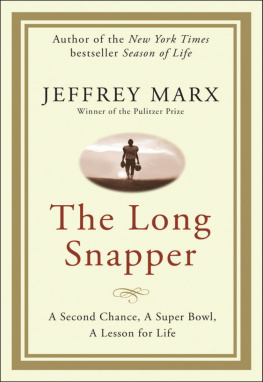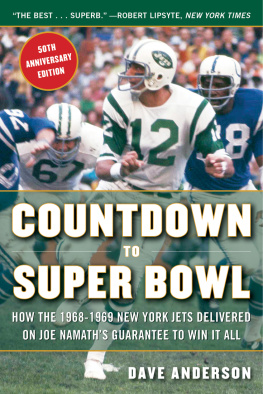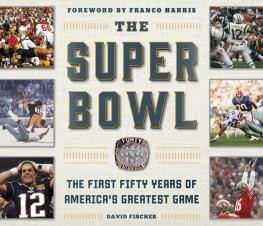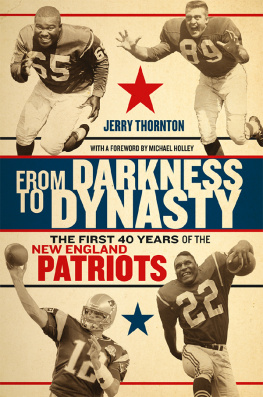The Long Snapper
A Second Chance, a Super Bowl, a Lesson for Life
Jeffrey Marx

For Leslie Marx (Po to me)
This book is also dedicated to the memory of Wendy Marx,
my only sister and best friend,
and to all who save lives through organ donation and transplantation
Contents
The job is probably the most obscureand certainly the most
He never really liked the idea of keeping his cell
Jacob Calvin Kinchen had a lot to consider when it
The first flight of the dayfrom Baton Rouge to Atlantawas
He never aspired to be a long snapper, never even
His initial road trip as a professional athlete would have
One of the strangest things about being out of football
It did not take Brian long to feel that he
For a family with four generations of roots firmly planted
When Lori went back to Foxborough for the Patriots divisional
With the second semester beginning back at Parkview, Brian wanted
The Patriots already knew everything they needed to know about
Logan Kinchen began his eighth birthday with a sweet and
Brian could not have been in a better frame of
A big part of the problem was that Brian simply
A white fire engine, lights flashing and siren blaring, led
Concerned about poor conditions of the field they were using
Brian had long ago learned not to get too hyped
Eight hundred miles away, Harper LeBel was at his home
A portable stage was positioned at the center of the
Two days after the Super Bowl, Boston threw a victory
T he job is probably the most obscureand certainly the most unusualin any of the major professional sports. It requires a big, strong man to submit to a stance that is both awkward and precarious. He is bent forward at the waist, legs apart, arms outstretched. His head is dropped and facing back between his legs. Looking upside down at the world, he grips a prolate spheroid, basically an oblong shape with pointed ends, covered with pebbled leather and adorned with eight white laces. Most people just call it a football. And the man now holding it, soon to be unleashing the ball on its way to being kicked by another player, is called the long snapper. As soon as he lets loose of the football, he will get clobbered and stepped on and generally abusedall well within the accepted rules of engagement in the National Football League.
The NFL employs thirty-two long snappers at a timeone per team in a limited but vital capacity that represents the evolution of sports into the era of specialized roles. If the long snapper does his job well, he will routinely perform before millions of people without ever being noticed. Total anonymity is considered perfection. And perfection is quite rewarding. In 2003, when our story begins, the average NFL long snapper was paid an annual salary of more than half a million dollars. He also ate and traveled extremely wellall courtesy of his employerand the standard pampering and perks certainly did not stop there.
But this exalted existence at the highest level of sport can be transformed into sheer agony with such dizzying dispatch. A single mistake at the wrong time, just one little slip or lack of concentration at a critical moment in a big game, and if you are the long snapper, youre instant fodder for the media machine that never rests. Youre on the evening news, the goat of your city. Your mistake is shown on ESPN over and over again, dissected in slow motion. Youre an easy target on sports radio. And thats not even the worst of it. You could also be cut from the team. Fired.
There is always someone on the outside who desperately wants your job. He and his agent are constantly watching and waitingwatching for the first time a long snapper botches a play that costs his team a game, waiting for that perfect moment to call the general manager and encourage him to make a change.
You can also lose your cherished job through no fault of your own. Football being football, the most violent of American games, your season or even your entire career might just come to a halt by way of injury. Nothing you can do about that. Of course, given the zero-sum nature of professional sports, a dream denied for one automatically means the chance of a lifetime for another.
Nobody knew that better than Brian Kinchen.
D ECEMBER 15, 2003.
B ATON R OUGE, L OUISIANA.
H e never really liked the idea of keeping his cell phone on while teaching. He certainly would not tolerate such behavior from the seventh graders in his Bible class at Parkview Baptist Middle School, especially not now, while reviewing for the end-of-semester final exam that was only two days away. But Brian Kinchen had a wife and four young sons. He could not imagine being unreachable in an emergency. The phone was tucked away, on silent, in the front left pocket of his slacks, when he felt it vibrate at 9:20 that Monday morning. The little screen showed an unfamiliar out-of-state number.
Hello?
Hey, Brian, its Scott Pioli.
An old friend from a previous existence.
Brian was an ex-jock. At the age of thirty-eight, after thirteen years of professional football and almost three years of searching for whatever might be next, he was new to teaching. He and Pioli were friends from their long-ago days together with the Cleveland BrownsBrian when he was a young player doing everything he could to keep his spot on the roster, Pioli when he was a young personnel assistant trying to move his way up in the front office. Pioli still worked in the NFL but now operated on a whole different level. As vice president of player personnel for the New England Patriots, he was one of the most respected executives in the league, working closely with head coach Bill Belichick, who was on his way to becoming the NFLs winningest coach of the decade. Together they had orchestrated the franchises first Super Bowl victory after the 2001 season. And nowwith only two weeks left in the 2003 regular seasonthe Patriots were well positioned for another championship run.
Brian and Pioli had not spoken for nearly a year. Why this out-of-nowhere call at a time when his schedule has to be crazy? Brian wondered. Must be about that hat I asked him to have Belichick sign for that lady I met. After the obligatory small talk, Brian cut to the chase: Hey, man, wheres my hat? I never got the hat.
Pioli had an entirely different agenda.
Listen, he said. Youre not gonna believe this, Brian, but we need to get a look at you. Bill wants to get a look at you.
Brian was familiar enough with football-speak to know exactly what that meant. His old coachBelichick had been head coach in Cleveland when Brian and Pioli were therewanted to fly him into Boston for a tryout. Brian was absolutely stunned. He paced in front of his class.
Youre serious?
Our long snapper got hurt, Pioli said.
Most of the two dozen students were distracted from working on their review material, trying to figure out what in the world their teacher was dealing with on the phone.
Im thirty-eight years old, Brian said.
Pioli already knew that, of course, but Brian was only thinking out loud. You realize how long its been since Ive played football? I mean, I still work out, just went to the gym before school this morning, but Im probably down about twenty pounds from the end of my career.
Brian stood almost six-foot-three and now weighed less than 220, big for everyday life, but not for someone banging heads with defensive linemen in the NFL.
Not a problem, Pioli said. We just need you to snap. We dont need you to block. Dont need you to cover. Just snap. Just get the ball back there.








